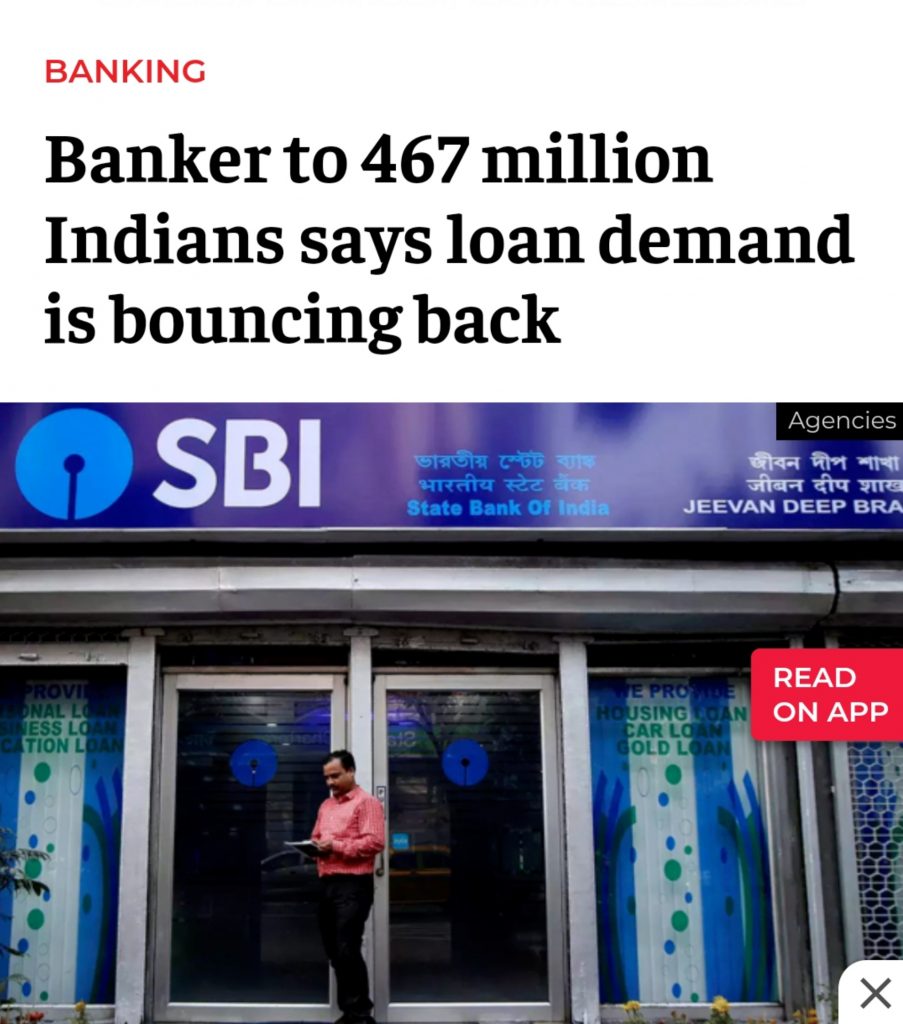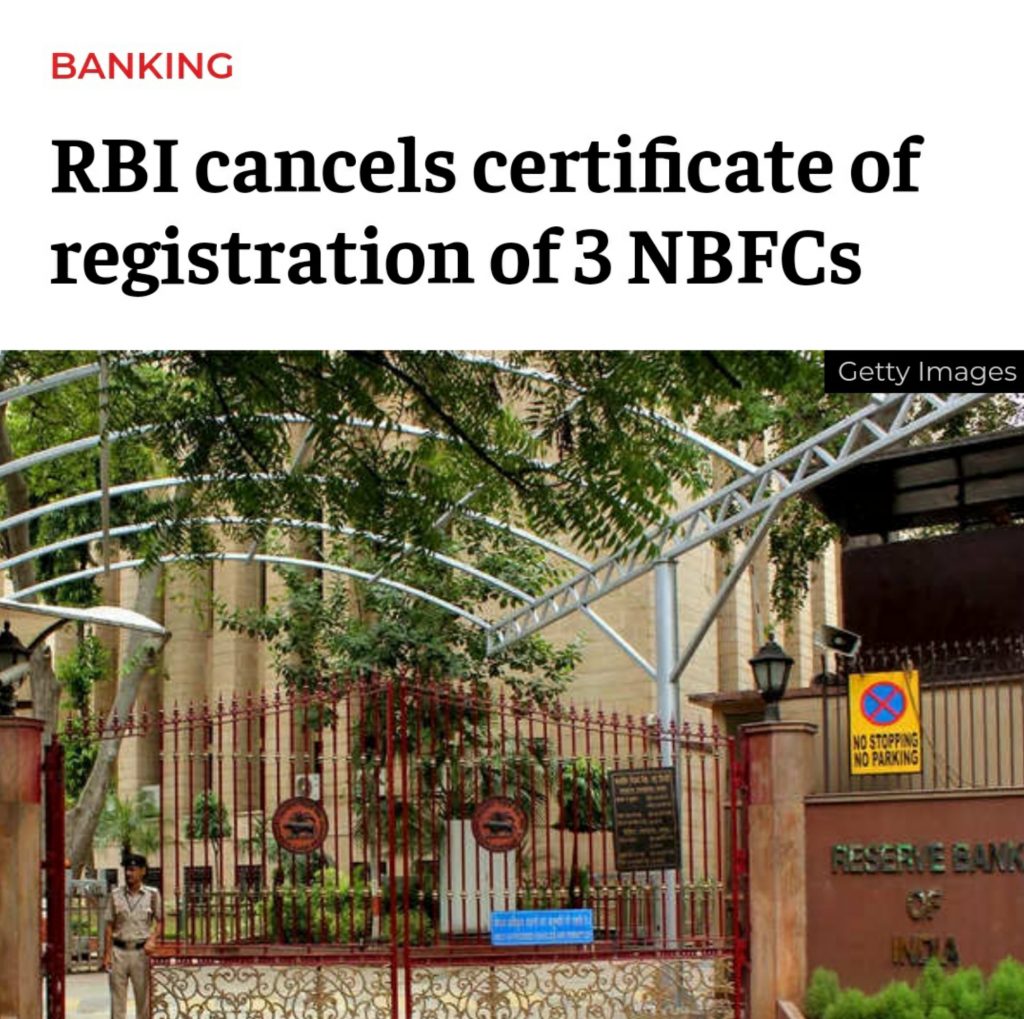RBI cancels license of — NBFC. Headlines hit hard sometimes.
I start the day with a cup of coffee and financial news. And this image popped up on my screen today.


What does it imply?
The demand for loans has picked up in the post Covid economy. The topmost bank in the country needs to scale up its capability and operations to meet the enhanced demand.
Obviously, there will be a number of people who want to borrow, but their loan applications will be rejected on various grounds. Who steps into the picture at this stage?
Non-banking finance companies or non-banking financial institutions – they are key drivers to making easy loans available at the grassroots.
Then why is RBI cancelling licenses of NBFCs at a speed never seen before? Close to 800 NBFC licenses have been cancelled in the last one year.
Why are we talking about red flags?
Obviously, malpractices are happening.
NBFC DEPOSITORS’ CONCERN
The first concern we have is about depositors, who place their money with NBFCs to earn high rates of interest.
When a NBFC declares insolvency like Dewan Housing Finance Ltd (DHFL), we see investors run helter-skelter to recover money.
For those who are not in the loop, the Deposit Credit Guarantee Corporation of India or DICGC does not cover the risk on NBFC fixed deposits. We go by credit ratings, but manipulated balance sheets can misrepresent credit ratings too. As it happened with DHFL and many other companies…
The depositors need to approach Consumer Forum or Company Law Board to get their money back. Experienced Indians can well imagine the time it takes, with no certainty about the final outcome.
Related post – Risk Management in Financial Planning
WHY SHOULD NBFC BORROWERS WORRY?
Borrowers need money, and get it from NBFCs when banks reject their applications for multifarious reasons.
Why do NBFCs lend to people not considered good enough by banks?
1. Income from high interest rates
They accept a higher risk, and charge a higher rate of interest for it. Not just high, the rates of interest are astronomical or usurious as we may call it. It goes under the guise of quoting a rate per month, instead of per annum. Vulnerable borrowers do not see through the veil immediately –
2.5% per month translates to 30% p.a.
3.5% per month translates to 42% p.a.
These are obnoxiously high rates, but borrowers with a short-term need may be willing to pay the same. The trouble starts when they are unable to repay.
2. Low credit rating
This is the real catch. Banks ask for a minimum credit score of 750. NBFCs target the segment with a credit rating of 600-750. They lend to employees with a minimum specified take home pay, which can be as low as Rs.12000/- p.m.
Do you get the drift here? They lend to a segment whose need is strong, but financial behaviour is questionable. They accept the risk, and employ strong arm tactics for recovery.
GOOD NBFCs
Let me clarify that this is not the norm. There are good reputed non-banking financial companies which help borrowers with speedy processing of loans. They cater to the large demand for home loans and education loans, and are much needed in the system.
Microfinance companies are doing a wonderful job in disbursing small value loans at grassroots level.
P2P Lending companies are licensed as NBFCs and offer a new asset class to the investor for diversification in the portfolio.
But it does not help to know that NBFC licenses are being cancelled every week.
NBFCs are called shadow banks. Which are these shady shadow banks, which exploit the masses?
Let us understand that RBI is not trigger happy about cancelling licenses. It is not a matter of first resort.
RBI issues them a show cause notice and gives an opportunity to clarify its stance. There is a provision for appeal against cancellation of licenses by RBI.
Related post: NBFC License Cancellation – Procedure and Grounds
Yet, some companies have come forward to surrender their license, knowing that they cannot stand the RBI scrutiny on compliance with norms.
COMMON REASONS FOR CANCELLATION OF NBFC LICENSES
- Lack of net-owned funds as per RBI norms
- Usurious rates of interest
- Malpractices in the lending process
- Unethical methods of recovery
HOW DOES A BORROWER SUFFER?
Loan applicants are vulnerable to malpractices.
They are asked to upload KYC documents online, which may be used for fraudulent purposes.
A loan is sanctioned in-principle, and the borrower is asked to pay a certain amount as processing fee and other charges. The fraudulent company may disappear after that.
The loan is granted only through an app. As soon as the borrower downloads the app, the lender has access to Contacts and all other data available on the device. This is then used to threaten and blackmail borrowers, if they are unable to repay.
Very high rates of interest lead to default, and the harassment process starts after that. We know about a couple of suicides which highlighted prevalent malpractices in the system.
Apps are easily available on app stores, but they are not lenders. The actual lender is a NBFC or foreign company using the app to target borrowers. Unfortunately, many borrowers are not aware of who is the lender. This hinders the process of lodging complaints and seeking justice from the right channels.
What happens to the borrower when the NBFC license is cancelled?
Legally the borrowers are liable to repay the loan. It is as much as the NBFC is liable to return money to investors or lenders.
Practically, the borrowers may defer repayment in the hope that the portfolio will be bought by another NBFC at a discount. They feel entitled to the discount, but final results are uncertain.
It is incorrect to assume that the borrowers’ liability ends with the cancellation of NBFC license.
WHAT ARE THE RED FLAGS FOR NBFC CLIENTS?
1. Lending to borrowers with low credit scores
When they dilute the parameters of creditworthiness, they enter risky ground. It means there is a high chance of default in repayment, and it puts the depositors’ money at risk.
Just to clarify that all NBFCs are not deposit-taking companies …Only a few are licensed to do so, but a deep dive into their lending policy is needed more than their reputation and credit rating.
2. Phone calls from untrained executives
Banks and reputed companies employ debt recovery agents who are certified by Indian Institute of Banking and Finance, and are trained in ethical methods of recovery.
If you receive phone calls from executives who are rude, unprofessional and use foul language, treat it as a red flag. It means the company is not abiding by the Model Code of Conduct for Debt Recovery Agents by IBA, and Fair Lending Practices Act of RBI. They are flouting laid down norms for outsourcing recovery tasks, and are likely to soon get into trouble.
3. Dilution of KYC norms
They might relax a lot of conditions only to onboard you as a borrower. Or they may mislead you saying certain documents are not needed, but later step up the pressure to obtain those. Their agents land at your doorstep for a document pick up.
The initial promises are misleading.